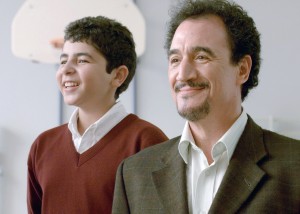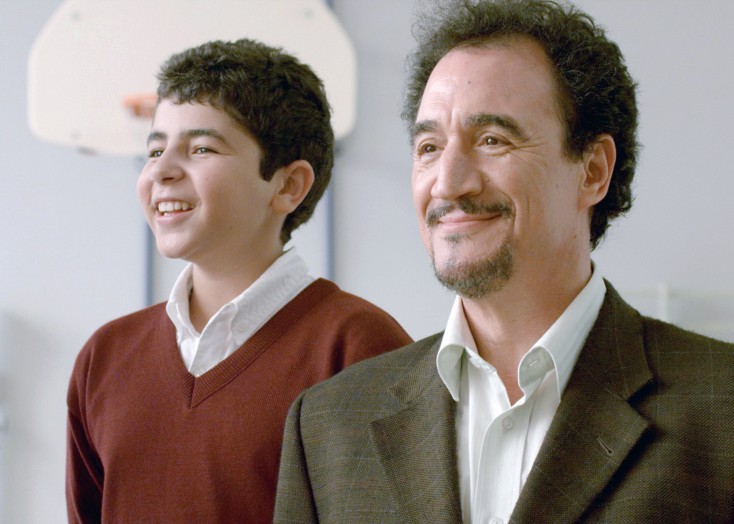
(l-r) Abdelmalek (Seddik Benslimane) and Bachir Lazhar (Fellag) in Philippe Falardeau "Monsieur Lazhar." ©Music Box Films. (Click on photo for hi-res version)
By ANGELA DAWSON
Front Row Features
HOLLYWOOD—Philippe Falardeau can empathize with the Denver Broncos. He made it all the way to the Academy Awards earlier this year with his dramatic French language “Monsieur Lazhar,” only to lose to Iran’s “A Separation.”
“They say you can’t lose an Oscar, you can only win one,” the Canadian filmmaker says, philosophically. “Still, I would have loved to bring the Oscar back home to my province and my country.”
Falardeau, 43, shouldn’t despair. His film, based on a one-man play by Evelyne de la Cheneliere, has scored other film prizes include Canada’s Genie award (for directing) and overwhelming positive audience reaction around the globe.
“Monsieur Lazhar” tells the story of an Algerian immigrant substitute teacher (Algerian actor Fellag) who brings emotional stability to a Montreal middle school class after the suicide of their well-liked teacher. Meanwhile, the widowed teacher is dealing with his own grief as well as government red tape over his immigration status.
Falardeau fleshed out the story to include a number of new characters, including a young boy who quietly blames himself for his teacher’s tragic act and a young girl, with whom he develops a bond, to make the story more cinematic.
On the eve of “Monsieur Lazhar’s” U.S. debut, Falardeau sat down to discuss the film’s universal appeal.
Front Row Features: What drew you to adapt the play into a movie?
Falardeau: It’s difficult for me to recall exactly what I wanted to talk about before writing the script. I knew I was interested in immigration so when I found the subject by watching the play, I saw it had a rich character who’s an immigrant, but the story goes way beyond that. I liked that it took place in a school, which allowed me to look at many other things involving the state of public education, bureaucracy and communication. The school is kind of a microcosm of society, so anything can happen in a classroom. It’s an incubator of life.
Front Row Features: Were you surprised by what you found in your research regarding the rules teaches must adhere to involving their relationship with their students? For example, they are not able to soothe or comfort a child even with an innocuous touch.
Falardeau: What surprised me is that the rules seem a little more rigid than when I was in school. They now have a protocol for everything. They have specialists for everything. As for the issues involving touching students, that was something I talked about with Evelyne about adding to the film because it was not in the play. I needed to sustain dramatic tension so I invented the character of the boy who had a special relationship with the deceased teacher and it went bad because of a wrongful accusation. That’s not why she committed suicide but that’s what (the boy) thinks. When we deal with suicide, we deal with the survivors. In this case, the boy feels guilty so I explored that in the film.
Front Row Features: Did you try to cast child actors that specifically fit the characters you had written in your script or did the youngsters you found influence your creation of the characters?
Falardeau: I cast all the children for the same role, either (of the two lead children) Alice or Simon. If they were good but not necessarily right for those roles, I tried to find them another role. For example, the boy who plays the student from Chile, doesn’t really look Chilean, so I changed the script so he says, “My mother’s from Quebec and my father’s from Chile.” We don’t care he doesn’t look Chilean. Actually, what does a boy from Chile look like? For me, it was important to work with him. I wanted to work with him, so worked the character around him.
Front Row Features: Was it difficult to cast Alice, who develops a strong bond with Monsieur Lazhar?
Falardeau: She was not the toughest role to cast but she was the most important one for me because is my point of view in the film. I needed someone who could play a precocious child, a more mature child, and (actress Sophie Nelisse, who plays Alice) has those mature eyes that are very striking.
Front Row Features: Was it difficult filming inside a school?
Falardeau: It was a nightmare to come up with different angles and ideas for design because four (classroom) walls can get boring. I always wanted to shoot towards the window so the light always would be there.
Front Row Features: Did you sit down and talk to the kids about suicide or did you try and shelter them from that element of the story? Also, could any of them relate to the experience of loss?
Falardeau: The boy who plays Simon (Emilien Neron) could, because he lost his uncle to suicide a year before we made this. I didn’t know it when I cast him but he definitely dug deep into his own emotions for his character, especially near the end of the film. I went through the script with all of them and I asked them questions and they asked me questions. They used their own words to express themselves and they knew what to say. They don’t use the same vocabulary we do as adults to engage in these topics but they know instinctively there is something important there.
Front Row Features: What’s been the response to this film around the world?
Falardeau: It’s scary how accepted it’s been. I have to wonder what did in this film that I didn’t do on my other films? It must be the story. It deals with immigration and kids. So maybe that’s what it translates well. I may have to accept that my next film may not translate as easily, but that’s OK. This one is the one I thought would have the least commercial potential but it has grossed more than twice as much as my three previous films did combined just in Quebec. Why? Maybe it’s better than my other films, but it’s not that much better.
Front Row Features: How did you cast Fellag, who I understand is a stand up comedian.
Falardeau: I didn’t know him before I cast him. He’s originally from Algeria but lives in France. He’s well known in the North African community. Algerians and Moroccans around the world know him. He’s a superstar. We didn’t know him in Quebec and now we know him. His character name has become somewhat of an expression. You now say about a person, “He’s a Monsieur Lazhar.” I was listening to some talk radio in Quebec and people were calling in and talking about the Monsieur Lazhar in their own lives. So it’s become a pop culture expression.
Front Row Features: How have teachers responded to your film?
Falardeau: They really seem to like the film and I was so worried they would reject it. They have embraced the film and made it their own. I’m sure they experience a lot of the bureaucratic issues that the teachers and the principal does in this film.
Front Row Features: What was the playwright’s reaction to your movie?
Falardeau: She read my drafts, so she was involved in that way. She was involved in that way and she gave me some ideas. She asked me to make a film that wasn’t “too cute.” She thought the presence of the children might render the project too cute and I was cognizant of her concerns. Apart from that, she really liked what I did with the film, and I can foresee collaborating with her again on something else. She has a cameo as Alice’s mother. She thanks her own creation in the movie.
Front Row Features: What are you going to direct next?
Falardeau: I’m writing a political comedy that takes place in Canada. I haven’t touched it since last September. I want to make sure it’s relevant in other countries too. That’s the tricky part.
Front Row Features: Is it a satire?
Falardeau: The content is satirical but not the tone. There are few comedies that also are emotional and that’s what I want to do. The one that comes to mind that does it effectively is “Little Miss Sunshine,” where you laugh but you also feel for these characters.





